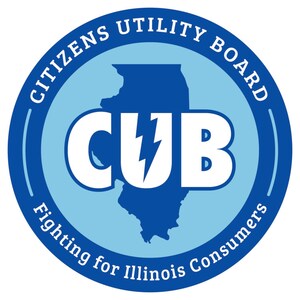CHICAGO, March 27, 2019 /PRNewswire/ -- The robust growth projected for the U.S. electric vehicle (EV) market will usher in lower electric bills for all Illinois consumers—including those who don't own a car—if policy makers adopt key measures necessary to unleash the savings, according to an analysis released Wednesday by the Citizens Utility Board (CUB).
The research is believed to be the nation's first analysis conducted by a consumer watchdog group into how the surging popularity of EVs on American roadways will impact electric customers and the power grid. The study, Charging Ahead: Deriving Value from Electric Vehicles for All Electricity Customers, is posted on the Research page of CitizensUtilityBoard.org.
Based on data reflecting actual electricity-usage patterns in Illinois, the study found that consumers could reap more than $2.6 billion in cumulative benefits on their power bills by 2030, if state officials establish policies that encourage motorists to charge their cars during times of the day when there is less strain on the power grid and electricity prices are at their lowest.
But if legislators and regulators don't implement smart charging policies—and EV owners charge their cars during periods of higher power demand—they risk increased stress on the grid and higher power bills. The study's authors estimate that anticipated EV proliferation could increase Illinois power bills by up to $856 million if nothing is done to encourage smart charging.
The report emphasizes that policy makers—not only in Illinois, but also throughout the country—will determine whether utility consumers capitalize on the savings, as EVs multiply coast to coast.
"While the EV revolution is still in its infancy, we're already approaching a crucial crossroads in how to manage the ripple effects on our electricity costs," said CUB Executive Director David Kolata. "This research shows that escalating EV sales could lead to lower utility bills for everyone. To ensure that we seize this opportunity for savings, the public can't afford for their policy makers to wait. Action is needed now to set policies that help EV owners charge their cars in a way that benefits everyone."
The report's recommendations constitute a policy blueprint that states should embrace in a quest to maximize the savings potential. Foremost among them is a call for states to automatically enroll EV owners in "dynamic" pricing programs, where rates vary depending on the time of day when power is consumed. These rates could apply only to the cost of powering the EV—other household usage would be billed separately according to whatever pricing plan the customer chooses—and car owners could opt-out of the program.
While electricity is most often billed under a fixed rate that rarely changes, dynamic prices fluctuate over the course of the day, as the total volume of demand on the system swells and dips. By funneling EV owners into dynamic plans on an opt-out basis—they could unsubscribe at any time—utilities can ensure the grid digests added demand from EVs without necessitating new expenditures on increased generation capacity or enhanced transmission and distribution infrastructure. EV owners, meanwhile, would benefit from electricity priced far lower than the regular fixed rate.
The report specifically advocates for automatically enrolling EV owners in a "Time of Use" (TOU) pricing program. A TOU plan would charge different rates for different blocs of time during the day, allowing EV owners to plan their charging when the price is lowest.
"We think TOU rate plans are one of the most practical forms of dynamic pricing, but there are many others," Kolata said. "The key point for policy makers is that we can harness money-saving power from EVs if we provide car owners with pricing plans that encourage them to charge their cars overnight when the grid is brimming with unused and extremely cheap electricity."
In a separate analysis of 2016 and 2017 data, CUB found that EV owners on one dynamic pricing plan could cut their electricity supply costs by more than 50 percent.
There are about 15,000 EVs in Illinois today, but the new study projects that number could surge to at least 690,000 by 2030—and it could catapult to as high as 2.2 million if the state embarks on an aggressive effort to reduce carbon emissions during the same time period. Such efforts have been discussed in the nation's capital as well as the Illinois Legislature, which is now considering a measure, the Clean Energy Jobs Act, that would promote EV growth in Illinois.
Those sales estimates formed the basis for the utility bill savings that the report attributed to EVs. The estimated $2.6 billion in total benefits reflect three different factors:
- $2 billion in lower costs for energy consumption.
- $124 million in lower costs for investments in "capacity." (Capacity refers to long-term purchase agreements a utility makes to ensure there is enough power available to meet future projected demand.)
- $536 million in additional utility revenue, allowing rate reductions of up to 12 percent.
"Electric vehicles produce many rewards for the public at large, including a reduction in pollution from autos and diminishing dependence on foreign oil," Kolata said. "Our analysis shows that EVs not only allow drivers to charge a car at a much lower cost than to fill at the pump, but they also have the potential to keep a lid on electric bills for all consumers."
CUB is celebrating its 35th anniversary as Illinois' leading nonprofit utility watchdog. Created by the Illinois Legislature, CUB opened its doors in 1984 to represent the interests of residential and small-business utility customers. Since then, it has saved consumers more than $20 billion by helping to block rate hikes and secure refunds. For more information, call CUB, 1-800-669-5556, or visit CitizensUtilityBoard.org.
SOURCE Citizens Utility Board
Related Links
http://www.citizensutilityboard.org
WANT YOUR COMPANY'S NEWS FEATURED ON PRNEWSWIRE.COM?
Newsrooms &
Influencers
Digital Media
Outlets
Journalists
Opted In





Share this article